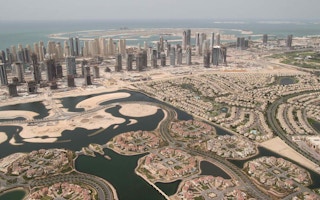The world’s tallest building, man-made islands shaped like countries, an indoor ski slope in the desert — these are not the only trademarks of Dubai. Nowadays, it’s also known for its traffic.
The multinational corporations that have flocked to the glittering high-rises of the United Arab Emirates’ flagship boom town have also priced out the average worker, many of whom struggle to find affordable housing.
Instead, many have been forced to move to neighbouring emirate Sharjah, leading to gruelling car commutes for those who cannot afford to live close enough to their work to take Dubai’s public transit.
In response, Dubai has taken initial steps toward a policy on affordable housing, such as a voluntary system for developers to set aside at least 15 per cent of units for lower-income use.
When mandatory, this policy is known as inclusionary zoning. The emirate’s publicly owned real-estate company, known for its glamorous developments, is even considering social housing.
“Rents and the high cost of living, if not addressed, will discourage future companies from relocating here,” Martin Cooper, the Dubai-based director of Middle East property at Deloitte told Bloomberg News last year.
“They need to start addressing it now, because affordability is increasingly becoming an issue even for those with relatively high income.”
Even Dubai, known for its luxury excess, will need to get serious about housing affordability if it wants to stay globally competitive, analysts are warning. For the real-estate sector, the urgent worldwide need for affordable housing could in turn be a lucrative opportunity.
“The demand is so big for affordable housing,” says Danielle Grossbacher, world president of the International Real Estate Federation (known by its French acronym FIABCI). “The trick is to find a return on investment reasonably close to what [developers] would get building on Billionaire’s Row in New York.”
But the real-estate sector can only get into the affordable-housing market — one traditionally dominated by the public sector — if policies change.
At its recent Habitat III Urban Thinkers Campus in Dubai, FIABCI called for the New Urban Agenda to encourage national governments to allow private enterprise in the affordable housing market.
The New Urban Agenda is the 20-year global urbanisation strategy that is expected to come the Habitat III conference in Quito, Ecuador, in October.
“Governments are tightening their belts, so if we just leave it to governments to resolve the situation, it’s going to be more difficult instead of easier,” Grossbacher said. “I’d like to see solutions coming from the private sector that make it interesting and rewarding to invest in affordable housing instead of only high-end luxury properties.”
She cited countries that have attracted private and institutional investors, such as pension funds, into their public-housing-development corporations.
Another example comes from Bangalore, where the municipal government scouts out suitable land for affordable housing and folds landowners into the deals by making them partners.
With an ownership stake in the new housing units, a landowner has a financial incentive to consent to the development — further, not paying upfront for the land can lower initial costs by 15 to 20 per cent.
On the surface, it might seem like the real-estate industry has little common cause with the humanitarian vision of the United Nations. Yet the FIABCI has been accredited with the U. N.since 1954, advocating on behalf of private property rights. The group lost a battle to have “private property” mentioned in the recently established Sustainable Development Goals, but it still considers Goal 11, the “urban” SDG, a victory.
When it comes to Habitat III, the federation is gearing up a campaign it’s calling the City We Need Is Affordable. It has plans to launch a competition for innovative private-sector-housing solutions next month. Winners will be announced at the FIABCI World Congress in Panama City in May and will be invited to Quito in October to display their ideas.
Citiscope is a nonprofit news outlet that covers innovations in cities around the world. More at Citiscope.org.










